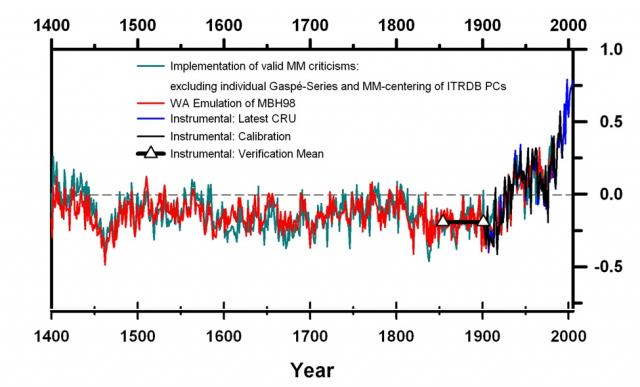In the Canadian tradition, it would be “unparliamentary” to accuse ClimateAudit’s Steve McIntyre of purposefully misrepresenting climate science, but his latest attack on the so-called “hockey stick” suggests that McIntyre is a great deal more interested in scoring distorted debating points than in saying anything that is actually factually correct.
McIntyre, apparently a retired mining stock promoter, has enjoyed a certain degree of fame in the denier community since 2003, when he and an economist named Ross McKitrick launched an attack on a graph (inset) by the highly respected actual scientist, Michael Mann.
In response to the M&M attack, Mann published an amendment to his original work, giving deniers the world over the courage to say that the original graph had been “debunked.” They then extrapolated to say that if there was an error in this single graph, that must mean that climate change wasn’t happening or wasn’t caused by humans – that the whole anthropogenic theory had collapsed in the math of a single published paper. Here is a recent and typically ridiculous example.
The debate has gone back and forth at length and is apparently without end. Most recently, McIntyre has been sniping at a dataset that had been analysed and reported by the U.K. climate scientist Keith Briffa. In his first whack, McIntyre accused Briffa of withholding data, and suggested that Briffa was trying to hide the fact that his climate reconstruction was based on an unforgiveably small number of trees.
Briffa responded. RealClimate scientists weighed in. The deniersphere erupted in ill-informed commentary celebrating this new effort to undermine the climate consensus. And regular DeSmogBlog trolls started posting comments assuring us that the whole complicated web of climate science was unravelling and would soon be dismissed as irrelevant.
Alas for the deniers, it turns out that this was all a little overblown. For example, as Tim Lambert reports at Deltoid, McIntyre has had the data all alongDeep Climate reports, the other scientists who generated the dataset in the first place have offered their rational for parsing it as they did before passing it to Briffa. Other, related data also support Briffa’s conclusions. It all checks out.
So, what was the point, exactly, of McIntyre’s intervention? He doesn’t seem to be particularly committed to advancing science, or you would think that he would be offering his work up for peer-review and publishing. He certainly isn’t dedicated to advancing public understanding of climate change, or he would have admitted long before now that, with or without Briffa’s Yamal data, there are a host of other hockey stick graphs, based on a huge variety of other source materials, all of which confirm the obvious – that global average temperatures have spiked in the last century and are currently breaking records that have stood for 1,000 years.
McIntyre, however, doesn’t seem interested in broadly based, well-support scientific conclusions. He just wants to play with the smallest part of what he sees as the weakest dataset and score cheap, irrelevant points – confusing the community of deniers yet further and bolstering his weird fame.
That being his goal, his right on his game. The title ClimateAudit, however, makes me wonder if there is another other motive in McIntyre’s madness. What would we learn if we could get our hands on a McIntyreAudit? Who’s paying for this strategic, if not always careful, number crunching?
C’mon Steve, fess up.
Subscribe to our newsletter
Stay up to date with DeSmog news and alerts







